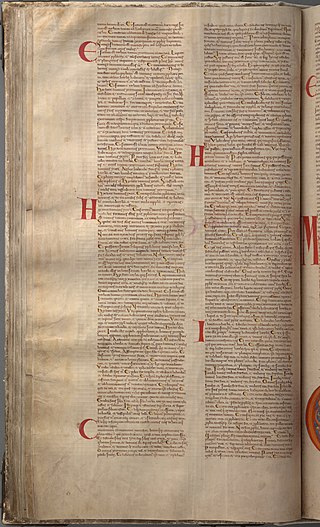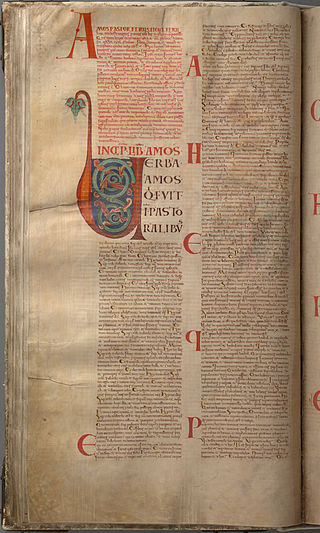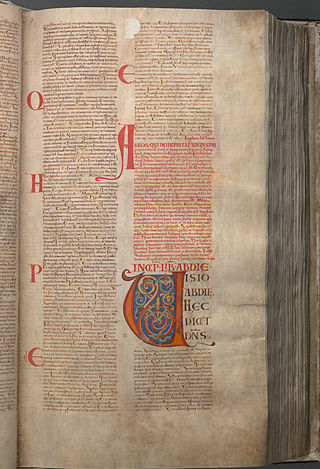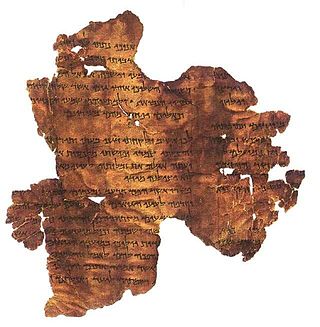Related Research Articles
John 7 is the seventh chapter of the Gospel of John in the New Testament of the Christian Bible. It recounts Jesus' visit to Jerusalem for the feast of Tabernacles, the possibility of his arrest and debate as to whether he is the Messiah. The author of the book containing this chapter is anonymous, but early Christian tradition uniformly affirmed that John composed this Gospel. Alfred Plummer, in the Cambridge Bible for Schools and Colleges, describes this chapter as "very important for the estimate of the fourth Gospel. In it the scene of the Messianic crisis shifts from Galilee to Jerusalem; and, as we should naturally expect, the crisis itself becomes hotter. The divisions, the doubts, the hopes, the jealousies, and the casuistry of the Jews are vividly portrayed." John 7:1 to 8:59 is sometimes referred to as the "Tabernacles Discourse". Raymond E. Brown describes the Tabernacles Discourse as "a polemic collection of what Jesus said in replies to attacks by the Jewish authorities on his claims".

The Bible contains many references to slavery, which was a common practice in antiquity. Biblical texts outline sources and the legal status of slaves, economic roles of slavery, types of slavery, and debt slavery, which thoroughly explain the institution of slavery in Israel in antiquity. The Bible stipulates the treatment of slaves, especially in the Old Testament. There are also references to slavery in the New Testament.

Revelation 20 is the twentieth chapter of the Book of Revelation or the Apocalypse of John in the New Testament of the Christian Bible. The book is traditionally attributed to John the Apostle, but the precise identity of the author remains a point of academic debate. This chapter contains the notable account of the "Millennium" and the judgment of the dead.
Isaiah 40 is the fortieth chapter of the Book of Isaiah in the Hebrew Bible or the Old Testament of the Christian Bible, and the first chapter of the section known as "Deutero-Isaiah", dating from the time of the Israelites' exile in Babylon. This book contains the prophecies attributed to the prophet Isaiah, and is one of the Books of the Prophets. Parts of this chapter are cited in all four canonical Gospels of the New Testament.

Zechariah 6 is the sixth of the 14 chapters in the Book of Zechariah in the Hebrew Bible or the Old Testament of the Christian Bible. This book contains the prophecies attributed to the prophet Zechariah, and is a part of the Book of the Twelve Minor Prophets. This chapter contains the description of the eighth vision and the crowning of Joshua. It is a part of a section consisting of Zechariah 1–8.

Zechariah 10 is the tenth of the 14 chapters in the Book of Zechariah in the Hebrew Bible or the Old Testament of the Christian Bible. This book contains the prophecies attributed to the prophet Zechariah, and is a part of the Book of the Twelve Minor Prophets. This chapter is a part of a section consisting of Zechariah 9–14.

Amos 2 is the second chapter of the Book of Amos in the Hebrew Bible or the Old Testament of the Christian Bible. In the Hebrew Bible, Amos is a part of the Book of the Twelve Minor Prophets. The book contains prophecies attributed to the prophet Amos. This chapter contains his prophecies regarding God's judgment against Moab, Judah, and Israel, following a pattern established in chapter 1.

Amos 4 is the fourth chapter of the Book of Amos in the Hebrew Bible or the Old Testament of the Christian Bible. In the Hebrew Bible it is a part of the Book of the Twelve Minor Prophets. This book contains the prophecies attributed to the prophet Amos, especially the denunciation of Israel's nobles as Israel is reproved for oppression, Amos 4:1–3, for idolatry, Amos 4:4,5, and for their incorrigibleness, Amos 4:6–13. Jennifer Dines treats Amos 3:1-5:17 as a single literary unit, whereas John Nelson Darby treats each chapter, except for chapters 1 and 2, as "a distinct prophecy".

Amos 6 is the sixth chapter of the Book of Amos in the Hebrew Bible or the Old Testament of the Christian Bible. In the Hebrew Bible it is a part of the Book of the Twelve Minor Prophets. This book contains the prophecies attributed to the prophet Amos. The Jamieson-Fausset-Brown Bible Commentary summarises this chapter as
[a] denunciation of both the sister nations for wanton security — Zion, as well as Samaria: threat of the exile: ruin of their palaces and slaughter of the people: their perverse injustice.

Amos 8 is the eighth chapter of the Book of Amos in the Hebrew Bible or the Old Testament of the Christian Bible. In the Hebrew Bible it is a part of the Book of the Twelve Minor Prophets. This book contains the prophecies attributed to the prophet Amos; in particular, the seventh, eighth, and ninth chapters contain visions and their explanations. This chapter opens with a vision of a basket of summer fruit.

Hosea 3 is the short, third, chapter of the Book of Hosea in the Hebrew Bible or the Old Testament of the Christian Bible. This book, part of the Book of the Twelve Minor Prophets, contains the prophecies attributed to the prophet Hosea, son of Beeri, and this chapter refers autobiographically to Hosea's marriage to a woman who is an adulterer. His purchase of her from a paramour is treated in the Jamieson-Fausset-Brown Bible Commentary as a symbol of "Israel's condition in their present dispersion, subsequent to their return from Babylon".

Hosea 6 is the sixth chapter of the Book of Hosea in the Hebrew Bible or the Old Testament of the Christian Bible. In the Hebrew Bible it is a part of the Book of the Twelve Minor Prophets. This chapter contains prophecies attributed to the prophet Hosea, son of Beeri, including an exhortation to repentance and a complaint against Israel and Judah for persisting still in their wickedness.

Hosea 8 is the eighth chapter of the Book of Hosea in the Hebrew Bible or the Old Testament of the Christian Bible. In the Hebrew Bible it is a part of the Book of the Twelve Minor Prophets. This chapter contains prophecies attributed to the prophet Hosea, son of Beeri, about the impending destruction of Israel and Judah for their impiety and idolatry.

Hosea 9 is the ninth chapter of the Book of Hosea in the Hebrew Bible or the Old Testament of the Christian Bible. In the Hebrew Bible it is a part of the Book of the Twelve Minor Prophets. This chapter contain prophecies attributed to the prophet Hosea, son of Beeri, about the distress and captivity of Israel for her sins, especially for committing idolatry.

Hosea 10 is the tenth chapter of the Book of Hosea in the Hebrew Bible or the Old Testament of the Christian Bible. In the Hebrew Bible it is a part of the Book of the Twelve Minor Prophets. This chapter contains prophecies attributed to the prophet Hosea, son of Beeri, dated by the Jamieson-Fausset-Brown Bible Commentary to the period between Shalmaneser V's first and second invasions of Israel. Israel is reproved and threatened for its impiety and idolatry, and exhorted to repentance.

Hosea 11, the eleventh chapter of the Book of Hosea in the Hebrew Bible or the Old Testament of the Christian Bible, has been called "one of the high points in the Old Testament". In the Hebrew Bible is a part of the Book of the Twelve Minor Prophets. According to the Jamieson-Fausset-Brown Bible Commentary, this chapter contains prophecies attributed to the prophet Hosea, son of Beeri, about God's former benefits, and Israel's ingratitude resulting in punishment, but God still promises restoration.

Hosea 12 is the twelfth chapter of the Book of Hosea in the Hebrew Bible or the Old Testament of the Christian Bible. In the Hebrew Bible it is a part of the Book of the Twelve Minor Prophets. This chapter contains prophecies attributed to the prophet Hosea, son of Beeri, delivered about the time when the Kingdom of Israel (Ephraim) sought the aid of the Egyptian king So, in violation of her covenant with Assyria. References to contemporary events sit alongside allusions to the patriarchal age in Israel's history. Hosea exhorts the country's leaders to follow their father Jacob's persevering prayerfulness, "which brought God's favor upon him". The Jamieson-Fausset-Brown Bible Commentary notes that "as God is unchangeable, He will show the same favor to Jacob's posterity as He did to Jacob, if, like him, they seek God".

Hosea 13 is the thirteenth chapter of the Book of Hosea in the Hebrew Bible or the Old Testament of the Christian Bible. In the Hebrew Bible it is part of the Book of the Twelve Minor Prophets. The subject of this chapter and the following one is the idolatry of the Kingdom of Israel, referred to as Ephraim, notwithstanding God's past benefits, destined to be the country's ruin.

Hosea 14 is the fourteenth and final chapter of the Book of Hosea in the Hebrew Bible or the Old Testament of the Christian Bible. In the Hebrew Bible it is part of the Book of the Twelve Minor Prophets. This chapter concludes the prophecies attributed to the prophet Hosea, son of Beeri, with an exhortation to repentance, a promise of God's blessing, and a concluding verse resembling the wisdom tradition.

Ezekiel 45 is the forty-fifth chapter of the Book of Ezekiel in the Hebrew Bible or the Old Testament of the Christian Bible. This book contains the prophecies attributed to the prophet/priest Ezekiel, and is one of the Books of the Prophets. The final section of Ezekiel, chapters 40-48, give the ideal picture of a new temple. The Jerusalem Bible refers to this section as "the Torah of Ezekiel". In particular, chapters 44–46 record various laws governing the rites and personnel of the sanctuary, as a supplement to Ezekiel's vision.
References
- ↑ Deuteronomy 15:3
- ↑ Barnes' Notes on Deuteronomy 15, accessed 5 December 2015
- ↑ Jamieson-Fausset-Brown Bible Commentary on Deuteronomy 15, accessed 5 December 2015
- ↑ Matthew Poole's Commentary on Deuteronomy 15, accessed 5 December 2015
- ↑ Gill's Exposition of the Entire Bible on Deuteronomy 15, accessed 5 December 2015